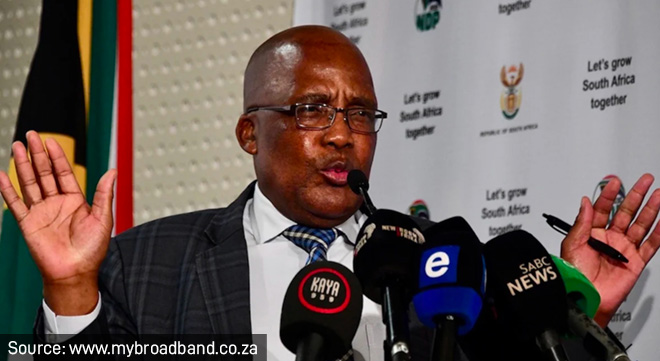The Minister of Health, Dr Aaron Motsoaledi (pictured), will “in the coming weeks” outline how the government intends to implement the Health Market Inquiry’s recommendations.
The Competition Commission initiated an investigation into the private healthcare sector in 2013, and the Inquiry published its findings and recommendations in September 2019.
The Inquiry made several recommendations to promote competition, enhance access, and improve efficiency and equity in the private healthcare system. None of the recommendations has been implemented.
“In the coming weeks, the Minister of Health will call a press conference to elaborate on the way forward with the recommendations of the Health Market Inquiry,” the Department of Health said in a statement on Monday.
The main purpose of the statement was to slam an article published by City Press on 12 January. The article claimed the ANC plans to table a compromise proposal at the first Cabinet lekgotla of 2025 on how National Health Insurance (NHI) can be implemented.
City Press said its sister publication, Rapport, “has learnt from authoritative ANC government sources that the proposal is for all South Africans working in the formal sector to be obliged to obtain medical coverage, but the state will compete with medical schemes to provide cheaper medical insurance through the NHI”.
The Department of Health said the allegations were “unfounded and ridiculous”. There is no such plan from either the ANC or the government. “Any insinuation thereto is the figment of the imagination of either the author of the article or his unknown sources.”
The City Press article was published only days after President Cyril Ramaphosa said that NHI will be implemented.
“As enjoined by the Freedom Charter, we will also want to ensure that we implement the National Health Insurance Act, the NHI, and provide universal access to quality healthcare that is free at the point of service, meaning that the NHI will be implemented. We will proceed with that,” he told the presidential gala dinner on 10 January, which formed part of the ANC’s 113th birthday celebrations.
The article was headlined “New NHI compromise: ANC wants to force medical schemes to be cheaper”.
The health department said it is “an uncontested fact” that private healthcare costs are escalating at a rate that are “likely to collapse the sector”.
“However, even people with rudimentary knowledge of private healthcare will know that forcing medical aids to be cheaper is not a solution to this problem. In fact, it will be dumb for anyone to suggest that.”
The department said it is “surprising that certain segments of the media keep second-guessing” what will be done about private healthcare costs because the Health Market Inquiry (HMI) conducted “a six-year deep investigation into this matter”.
It was in this context that the statement said Motsoaledi will outline how the government intends to implement the Inquiry’s recommendations.
Complementing NHI
The HMI’s report noted that the Inquiry was concluding its work when South Africa is embarking on a journey to establish a NHI Fund.
The NHI Bill was tabled in Parliament on 7 August 2019 and signed into law on 15 May last year, but the Act has not yet been promulgated.
The Inquiry viewed its recommendations as complementing the implementation of NHI.
“Full implementation of the NHI is some years away, with the Fund scheduled to be operational by 2026 at the earliest. The private sector will continue to operate in the interim and also after 2026. We have taken this into account in the implementation of our recommendations, which will provide a better environment in which a fully implemented NHI can function,” the report said.
“As the state becomes a purchaser of services (from the private sector as indicated by the NHI Bill), it will be able to enter a market where interventions like the establishment of a supply-side regulator, a standardised single obligatory benefit package, risk adjustment mechanism, and a system to increase transparency on health outcomes have already led to greater competition and efficiency,” the report said.
In June last year, Business Day quoted Dr Nicholas Crisp, the health department’s deputy director-general for NHI, as saying that some of the HMI’s recommendations were superfluous because they were part of NHI.
One of the Inquiry’s key recommendations is the establishment of a Supply-Side Regulator for Health (SSRH). The duties of the SSRH include:
- Establishing a multilateral negotiating forum for all healthcare practitioners to set a maximum price for the Prescribed Minimum Benefits (PMBs) and reference prices for non-PMBs.
- Licensing and accrediting healthcare facilities.
- Setting up committees or other processes to advise on best practice for particular medical conditions.
- Liaising with a proposed Outcomes Measurement and Reporting Organisation to ensure that practitioners report on health outcomes.
Crisp was quoted as saying that NHI is intended be the supply-side regulator for the entire healthcare system. “It would be superfluous to have another Schedule 3A public entity just to regulate the private sector while we are waiting to create the NHI.”
He said aspects of the Inquiry’s report did dovetail with NHI, such as its recommendation that all medical schemes offer a single, standardised benefit package.
“We would like to see the revision of PMBs harmonised with the [NHI’s] primary healthcare package and become that single compulsory product because that is exactly where the NHI is going.”




Can someone please give this, Crisp guy, tablets to increase his brainpower. He could not make it in the Private sector. That is why he hates it so much.